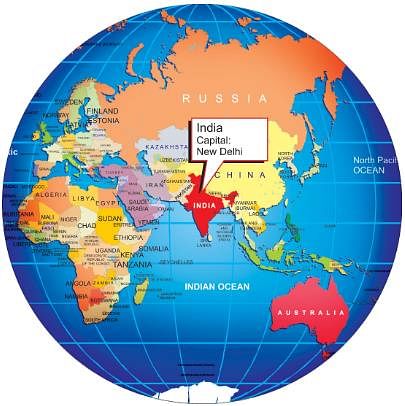Test: India - Location - 1 - UPSC MCQ
10 Questions MCQ Test - Test: India - Location - 1
Which of the following statement(s) is/are true?
Statement I: The Tropic of Cancer passes through the southernmost point of India.
Statement II: Indian Standard Time (IST) is based on the 82°30' E longitude.
Which of the following statement(s) is/are correct?
i. The standard meridian of India is 82°30' E longitude.
ii. India’s coastline is the longest in the world.
iii. The southernmost point of India is Kanniyakumari.
iv. India extends from 6°45' N latitude to 37°6' N latitude.
| 1 Crore+ students have signed up on EduRev. Have you? Download the App |
Which of the given below statement(s) is/are correct?
i: India’s latitudinal extent results in diverse climatic conditions across the country.
ii: The distance between two longitudes decreases as one moves towards the poles.
iii: India’s easternmost point experiences sunrise before its westernmost point.
iv: The Indian Standard Time is based on the 68°7' E longitude.
i: India’s latitudinal extent results in diverse climatic conditions across the country.
ii: The distance between two longitudes decreases as one moves towards the poles.
iii: India’s easternmost point experiences sunrise before its westernmost point.
iv: The Indian Standard Time is based on the 68°7' E longitude.
Arrange the following geographical features of India in the correct chronological order based on their formation or significance:
1. Formation of the Himalayas
2. Establishment of the Indian Standard Time
3. Development of the Ganga River system
4. Recognition of India's varied ecosystems
Which of the following statement(s) about India's geography is/are correct?
i. India extends approximately 3,214 km from north to south and 2,933 km from east to west.
ii. The southernmost point of India lies at 6°45' N latitude in the Arabian Sea.
iii. The standard meridian of India is 82°30' E, which is ahead of GMT by 5 hours and 30 minutes.
iv. The geographical area of India includes regions in the tropics and sub-tropical zones.
India's longitudinal extent leads to which of the following challenges?
Assertion (A): India's geographical location contributes to significant climatic variations across the country.
Reason (R): The latitudinal extent of India is approximately 30o, resulting in diverse ecosystems and weather patterns.
Assertion (A): India shares its borders with several countries in South Asia, including Pakistan, Nepal, and Bhutan.
Reason (R): The geographical location of India allows it to maintain maritime links with its neighboring countries through the Indian Ocean.



















